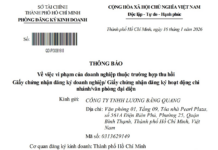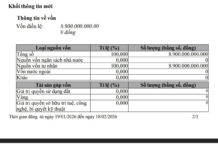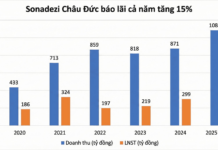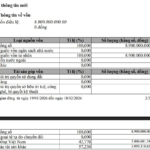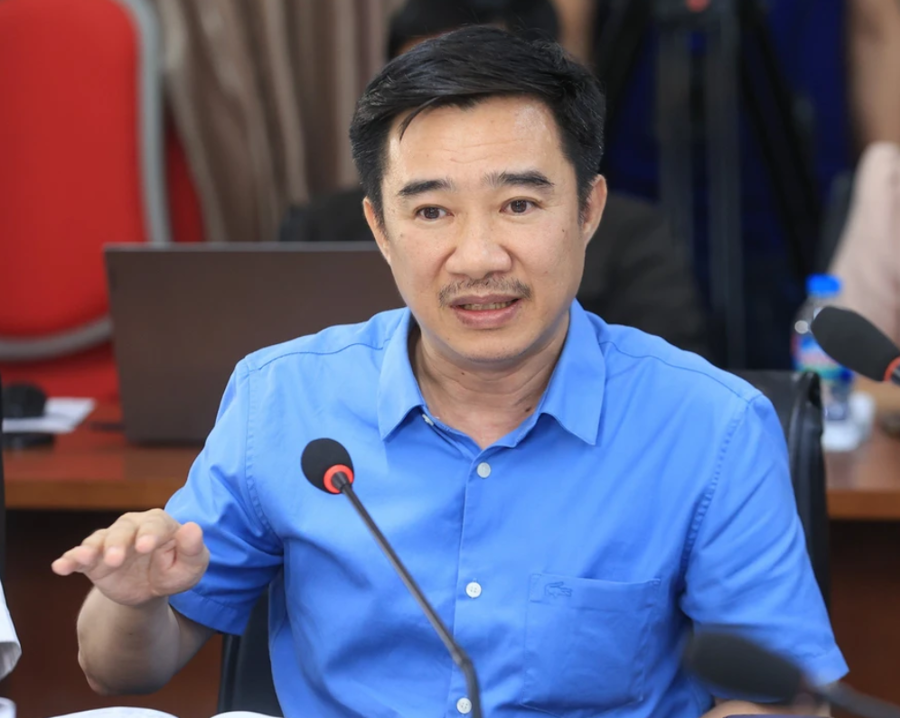Mr. Cao Anh Son, CEO of Viettel Telecommunications Corporation (Viettel Telecom), shared the journey of two decades of Viettel Mobile (15/10/2004 – 15/10/2024).
Great Aspirations Lead to Great Achievements
After 20 years, the story of Viettel becoming the leading mobile network in Vietnam still inspires entrepreneurs. Can you share the success factors of Viettel when entering the market at that time?
Looking back, we can say that Viettel was quite fortunate to have the right combination of “heavenly timing, geographical advantage, and human harmony.” Vietnam was a relatively large market with over 80 million people, and the telephone penetration rate was only about 4-5% – leaving much room for development. The country’s economy was also entering a dynamic growth phase, outpacing regional countries such as South Korea, Thailand, Singapore, Indonesia, Malaysia, and the Philippines. These were the objective conditions that presented Viettel with growth opportunities.
However, this opportunity was not exclusive to Viettel but was equally shared among the existing networks (MobiFone, Vinaphone, Sfone) and the new entrants (HTMobile, Gtel, EVNMobile). It was the internal factors that enabled Viettel to formulate the right strategies and take a different approach to overcome challenges and become the leading mobile network in the market.
At that time, Viettel was a small-scale company in the mobile telecommunications field, with limited capital, experience, and resources. However, Viettel’s aspirations were immense. We wanted to build a mobile network by Vietnamese, for Vietnamese. We wanted to compete on equal footing with the top enterprises in the market, despite being outscaled by them. We envisioned that every Vietnamese citizen would own a mobile phone. Twenty years ago, these were strange ambitions, but they drove us all in one direction, despite the difficulties.
Can you elaborate on how this aspiration helped a small network like Viettel in 2004 rise to the top in Vietnam?
Since its establishment in 1989, Viettel has always aspired to become a technology company serving the Vietnamese people. However, due to limited resources at the time, we couldn’t turn this vision into reality immediately. Viettel obtained a telecommunications business license in 1995 but only started offering long-distance VoIP services in 2000.
Mobile telecommunications was a high-tech field that required substantial investment. The capital accumulated by Viettel from four years of VoIP business and construction was not enough. When we started our mobile business, Viettel had only 150 base stations in three major cities. This number was modest compared to other networks. Sfone, which launched a year earlier, had already covered 15 provinces and cities, while the more established Vinaphone and MobiFone were present in all localities with thousands of base stations.
The Party Committee and Board of Directors of Viettel made wise strategic decisions, turning challenges into opportunities for breakthrough. Firstly, the determination to maintain self-reliance was crucial for Viettel to independently execute strategies aligned with the aspiration to “popularize mobile phones,” ensuring mobile network coverage across the country, including sparsely populated, remote, and border areas. I believe that if we had involved foreign investors, they would have likely focused on profitability metrics per base station and might not have agreed to cover areas with fewer customers.
The right strategy created the difference for Viettel Mobile. It is well-known that Viettel negotiated to purchase equipment on deferred payment terms of 2-4 years to achieve a breakthrough in infrastructure across Vietnam. This was also an art of negotiation, ensuring cooperation while maintaining autonomy. The global telecommunications downturn presented Viettel with the opportunity to negotiate these deferred payment deals. However, this downturn became a springboard for Viettel’s robust development.
In tandem with the infrastructure strategy, business policies were also geared towards making mobile phones more accessible to the population, with reasonable prices and no usage limits. This aspiration permeated every officer and employee of Viettel, fostering a competitive atmosphere and a dedication to self-sacrifice. Step by step, Viettel overcame capital constraints and achieved breakthroughs in business, even amid challenges.
All these factors became prerequisites for Viettel’s remarkable growth, propelling it to become one of the top mobile networks in Vietnam within just four years, a position it has maintained to this day.
When did Viettel stop considering itself a “small network”?
To answer this question, let’s look back at our history. From the early days of our business, the goals set by Viettel were already unique: “A mobile phone for every Vietnamese citizen.” Later, similar objectives were set: “A smartphone for every Vietnamese,” “High-speed Internet access for every household,” and so on. You can see that Viettel’s strategic goals are not about market share, profits, or revenue but closely align with the country’s aspirations. This demonstrates that Viettel has always moved in step with the nation’s development orientation and has a strong desire to contribute to economic and social progress.

With such objectives, Viettel has always taken on significant societal and national issues. For instance, when we achieved “full coverage,” it meant that Viettel was committed to supporting disadvantaged groups. Integrating business with social responsibility has been our approach to achieving these goals.
I believe that Viettel has never been a small network because our aspirations have always been grand, even when the company’s scale was modest. By setting ambitious goals, standing firm in negotiations for equitable cooperation, and embracing challenges to achieve self-reliance, Viettel established its enterprise position from the very beginning.
When mobile subscriptions exceeded the population, the term “telecom saturation” was often mentioned. How did Viettel respond to this situation?
In my opinion, the telecommunications field does not have the concept of “saturation,” but there is a shift from traditional telecommunications to digital telecommunications. Telecommunication services, which used to be the primary offering, will now serve as an enabler for other services. In other words, “telecom saturation” only applies to a specific service or technology. Fifteen years ago, 2G mobile phones mainly served voice calls and SMS. In 2015, when the penetration rate of this service approached 100% of the population, we could say that 2G technology had reached saturation.
At that time, Viettel set a different goal: to popularize data services so that people could access digital technology. Throughout the 3G and 4G implementation phases, Viettel brought about the second revolution of popularizing smartphones and bringing mobile broadband connections to every Vietnamese citizen.
In 2018, only about 54% of customers used mobile data, but now, this figure has risen to over 92% (2024), higher than the global and Asian averages (82%) – according to GSMA Intelligence 2024. This indicates that 4G is nearing saturation, but the emergence of 5G technology marks the beginning of a new era, ushering in the phase of popularizing smart connections for every Vietnamese citizen.
Maturing Through Service to the Motherland
Is Viettel ready for a new chapter in telecommunications?
Definitely! But this time, it will be different. Viettel Telecom has shifted its business strategy from competition to collaboration. Changing our business perspective in this new phase aligns with our role as a market-leading enterprise.
Viettel will create a smart connection boom. Our role in this new phase is to continue pioneering the construction of digital infrastructure, ensuring super-broadband, super-connected telecommunications infrastructure, clean, open, and secure data infrastructure. This period also marks a strong shift for Viettel Telecom towards creating digital applications and platforms that benefit society’s development.

These platforms will undoubtedly be connected by broadband and the most advanced technology. Based on the foundations built by Viettel, society (including enterprises and independent developers) can freely innovate and create products for users. For example, self-driving cars, smart factories, and zero-latency television will be developed by society, offering services on Viettel’s platforms.
The resonance and co-creation of value will lead to an explosion of growth that Viettel Telecom brings to society, fostering the development of a digital economy, digital society, and digital government.
What are the specific goals of Viettel Telecom in the digital era?
As I mentioned, our strategy remains closely aligned with the Party and Government’s goals for national development. Viettel’s role in this new phase is to continue pioneering the construction of infrastructure for the country’s digital transformation, including critical infrastructures: 5G/6G, super-broadband fixed network, IoT infrastructure, and data infrastructure. Ensuring rapid and extensive coverage of digital infrastructure will accelerate the country’s digital transformation, boost the digital economy, and elevate people’s lives. This will also be the driving force for telecommunications growth in the coming years.
Initially, 5G will serve not only individual customers but also enterprises, government agencies, and more, contributing to social development and supporting digital platforms for the digital economy, digital society, and digital government. Of course, there were other platforms for development before 5G. Still, the technological advantages of 5G will accelerate this process, making it more convenient and timely. Viettel Telecom aims to provide 5G coverage to over 90% of the urban population during the 5G launch phase.
In parallel with building digital infrastructure, Viettel Telecom is also developing digital service platforms with the goals of promoting accessibility and collaboration. The TV360 digital television platform embodies our aspiration to bring high-quality digital television services to every citizen and household. The Viettel Home Smarthome platform is designed to connect all smart devices in a household more conveniently, modernly, and securely. Similarly, the SME Hub platform aims to connect all digital services for businesses on one platform, fostering their digital transformation.
In the past, when telecommunications meant just calling and messaging, the philosophy of “listening to understand the smallest needs of customers” was a well-known success factor for Viettel. Is this philosophy still valid in the digital age?
When it comes to listening, people often think of customer feedback: listening to understand customers’ needs better and serve them better. At Viettel Telecom, we listen to understand our customers’ needs, and from this understanding, we create services to offer them.
Initially, Viettel only had a few telecommunications-related services, but now we have integrated telecommunications and information technology to serve diverse customer segments, including individuals, enterprises, households, agencies, ministries, and the government. This is how we demonstrate our understanding and grasp of our customers’ inner needs and create suitable products. We actively listen and strive to understand our customers’ needs, even before they express them.

In the digital age, customers’ demands are becoming more stringent, and the environment for information exchange is becoming more diverse and complex. Telecommunication companies need to invest in multiple digital tools to take a proactive approach to understanding their customers. By actively listening to and reaching out to customers to help them solve their problems, telecom companies can build stronger connections with their subscribers.
Thank you for your valuable insights, Mr. Son!

